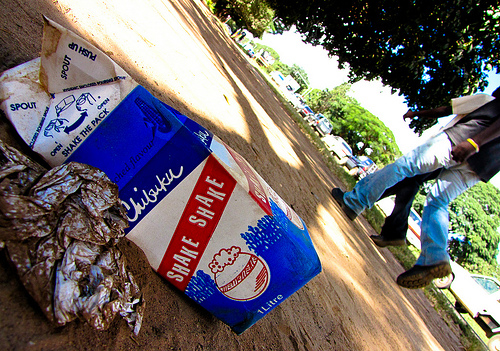
LUSAKA, ZAMBIA -- At age 15, Steven Chuwela says he loves the beer that is brewed locally in Lusaka.
“I like all Lusaka beer and Shake! Shake!,” he says referring to a local alcoholic drink called Chibuku, commonly referred to as Shake Shake because the thick, dense beverage has a tendency to separate.
By 10 a.m., Chuwela is leaning against the wall of his local bar. He has already had his first drink of the day. Despite being under age, the legal drinking age here is 18, Chuwela is not only a frequent customer at his neighborhood bar, he is also an employee.
Chuwela says he lost his parents at an early age and was not able to continue going to school because of financial constraints. He says it was through beer drinking that he found his job at the pub. “I am able to support [myself] with the money I am making working at the pub,” he says, though he lives with an older brother.
Underage drinking was once taboo here. But today, alcohol consumption has become a way of life for young people.
In Zambia, where the average life expectancy is just 45, the majority of the population, more than 70 percent, is considered youth, or under 30. High rates of severe poverty and an unemployment rate of more than 50 percent coupled with the scourge of HIV/AIDS -- more than 15 percent of people here are HIV positive – alcohol abuse among young people has become increasingly common. Children as young as 9 years old can frequently be found in bars or consuming alcohol on the streets. Government officials have been urged to increase enforcement and fines for both youth and bar owners, but a lack of recreational activities and employment opportunities have left the youth disillusioned and prone to drowning their sorrows.
“I am frustrated. I cannot find a job. And when I take alcohol, I forget about my frustrations,” says Jack Lungu, 18. “There are no jobs for us. What is left is for us to drink.”
George Mwila, a program officer of Youth Alive Zambia, an organization that works in partnership with local churches to raise awareness about HIV/AIDS and gender issues, says there is a long list of things that has led to the explosion of alcohol abuse by young people in Zambia – but a lack of recreational activities and employment opportunities top the list. “There are no play parks and government community halls are usually used for [children] under five,” he says.
With few outlets and minimal government or police enforcement of local laws, Mwila says it is no wonder that youth have turned to alcohol.
Francis Mulenga, a recent graduate of the University of Zambia says it is Zambia’s lack regulation and monitoring systems that are contributing to the rise in alcohol abuse here. “The government is not doing enough to ensure that laws stipulating alcohol are followed and that the drinking places are monitored to ensure that no one underage is allowed,” Mulenga says.
“The law enforcement commission should advocate and lobby to the relevant authorities to enforce the laws that regulate the selling of alcohol,” says Mulenga, who added the parents monitoring their children would also help to decrease the problem.
At Youth Alive Zambia, Mwila says his organization has worked with local government to educate and counsel youth on alcohol. But, “it was not enough as few were reached,” he says. Mwila says he hopes the local government will partner with the community to put a stop to alcohol abuse. “When the community is empowered they will be able to report to the local authorities those selling alcohol illegally,” he says.
At the national level, many leaders agree that alcohol abuse is a big issue. For Faustina Sinyangwe, a Member of Parliament, the issue of alcohol abuse is just one of many the government has failed to address. Last month, Sinyangwe spoke publically about her frustration with the non-implementation of the National Child Policy. The policy, which was not implemented by the Ministry of Sport, Youth and Child Development in August, sought to address many of the social ills plaguing the development of Zambian youth, including poverty, health care and nutrition, education, child labor, sexual exploitation, and alcohol and drug abuse.
Sinyangwe says alcohol abuse among youth is also giving way to risky behaving that is furthering the national HIV/AIDS crisis.
“Alcohol impairs judgment and as a result, people lack proper reasoning,” says Mulenga, adding that unprotected sex and prostitution are common at many local bars.
With more than 15 percent of the population HIV positive, advocates say that the increase in alcohol abuse among young people may also be contributing to the spread of AIDS.
“Girls come around in these taverns and they do not just come to drink. They come for sex,” says Lungu, from his perch at the bar. “I have no money, so I don’t entertain them,” he looking down and scratching his head.
After giving it a few moments of thought, Lungu adds, “Our leaders should give us skills by opening trade schools and then we will not be found in bars drinking beer.” He says he would like to learn how to be a carpenter.






